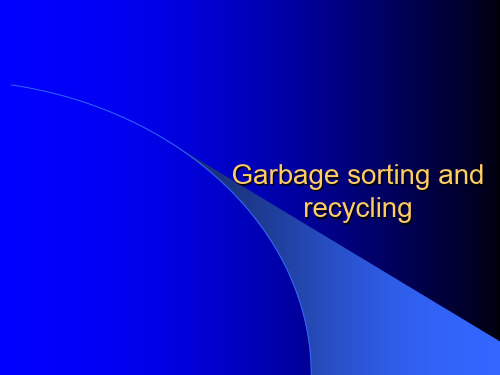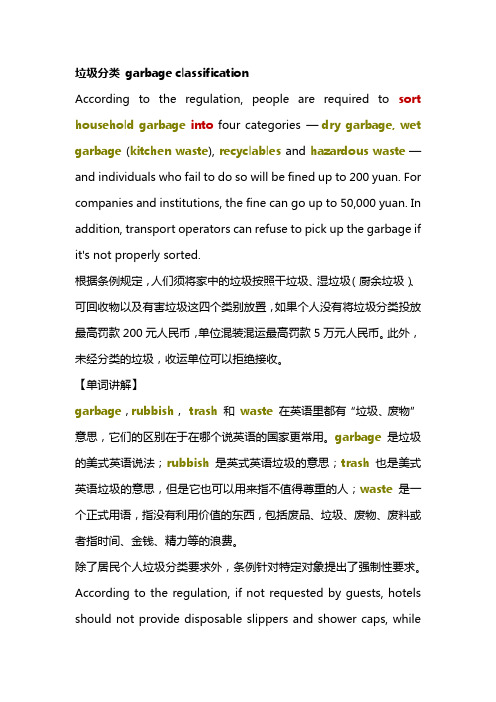Garbage-sorting-and-recycling-垃圾分类与回收
- 格式:ppt
- 大小:1.54 MB
- 文档页数:10



垃圾分类英语作文带翻译wtt收集整理的垃圾分类英语作文带翻译,仅供参考,欢迎大家阅读。
垃圾分类英语作文带翻译1The resources of the earth are limited. We should cherish and cherish these resources. So were going to do garbage sorting, and reuse the available resources again.地球的资源是有限的,我们要好好地爱护和珍惜这些资源。
所以我们要进行垃圾分类,再次利用这些可用的资源。
At home, remind everybody garbage classification, water bottles, cans, such as waste paper packed together to sell, resources recycling, and made money, the waste batteries, cartridges, etc in the recycling bins. In school, you can reuse and reuse garbage, put in two different trash cans, one is recyclable and one is unrecyclable. Learn from your classmates and discuss ways to classify rubbish. In the suburbs, we will use two bags to classify garbage, pick up the garbage that we see and classify it, so that it is the best young pioneers. This allows you to easily categorize.在家里,提醒大家进行垃圾分类,把矿泉水瓶,易拉罐,废纸等装在一起拿去卖,资源再利用了,又赚了钱,把废电池,墨盒等放到不可回收的垃圾桶里。


英语写作必背英文词汇:对抗雾霾英语写作必背英文词汇:对抗雾霾自产绿色食品 100-foot diet自产绿色食品(100-foot diet),指餐桌上的食物大部分或者全部来自于自家花园产出的作物。
它强调通过在家门口种植食材来减少碳足迹(reduce one's carbon footprint),从种植食材的花园(garden)到餐桌(dinner table)的距离(distance)一般不超过100英尺(within 100 feet)。
垃圾按量收费 pay as you throwPay as you throw(垃圾按量收费,缩写为PAYT)制度指每个家庭(household)都要为不可回收垃圾(non-recyclable rubbish)的处理支付费用,而费用的多少则根据垃圾的数量(quantity)和重量(weight)来计算。
在该制度内,可回收垃圾(recycled waste)的处理是免费的,也就是说该制度遵循的是“多循环,少交费(the more you recycle, the less you pay)”原则。
生态补偿机制 ecological compensation mechanisms生态补偿机制(ecological compensation mechanisms),是以保护生态环境(ecology environment)、促进人与自然和谐为目的,根据生态系统服务价值(values of ecological system service)、生态保护成本(the cost of ecology protection)、发展机会成本(the cost of development chance),综合运用行政和市场手段(administrative means and marketing means),调整生态环境保护(ecology environment protection)和建设(construction)相关各方之间利益关系的环境经济政策(environmental economy policy)。

垃圾分类garbage classificationAccording to the regulation, people are required to sort household garbage into four categories —dry garbage,wet garbage (kitchen waste), recyclables and hazardous waste—and individuals who fail to do so will be fined up to 200 yuan. For companies and institutions, the fine can go up to 50,000 yuan. In addition, transport operators can refuse to pick up the garbage if it's not properly sorted.根据条例规定,人们须将家中的垃圾按照干垃圾、湿垃圾(厨余垃圾)、可回收物以及有害垃圾这四个类别放置,如果个人没有将垃圾分类投放最高罚款200元人民币,单位混装混运最高罚款5万元人民币。
此外,未经分类的垃圾,收运单位可以拒绝接收。
【单词讲解】garbage,rubbish,trash和waste在英语里都有“垃圾、废物”意思,它们的区别在于在哪个说英语的国家更常用。
garbage是垃圾的美式英语说法;rubbish是英式英语垃圾的意思;trash也是美式英语垃圾的意思,但是它也可以用来指不值得尊重的人;waste是一个正式用语,指没有利用价值的东西,包括废品、垃圾、废物、废料或者指时间、金钱、精力等的浪费。
除了居民个人垃圾分类要求外,条例针对特定对象提出了强制性要求。
According to the regulation, if not requested by guests, hotels should not provide disposable slippers and shower caps, whilerestaurants and food delivery businesses should not provide disposable cutlery.条例规定,旅馆不得主动提供拖鞋、浴帽等一次性日用品,餐饮服务提供者和餐饮配送服务提供者不得主动提供一次性餐具。
与垃圾分类相关的英语单词及短语垃圾分类在世界各地变得越来越重要,因为人们意识到对环境做出积极的贡献的重要性。
垃圾分类可以帮助减少废弃物对环境造成的损害,促进可持续发展。
在进行垃圾分类时,一些相关的英语单词和短语是非常有用的。
1.垃圾分类相关的英语单词:- Garbage/recycling/composting:垃圾/可回收垃圾/堆肥- Waste separation:垃圾分类- Recycling center:回收中心- Landfill:垃圾填埋场- Organic waste:有机垃圾- Hazardous waste:危险废物- Plastic recycling:塑料回收- Metal recycling:金属回收- Paper recycling:纸张回收- Glass recycling:玻璃回收- Compost:堆肥- Waste management:垃圾处理- Environmental impact:环境影响- Sustainable development:可持续发展2.垃圾分类相关的英语短语:- Sort and separate the waste:分类和分离垃圾- Dispose of the waste properly:正确处理垃圾- Reduce, reuse, recycle:减少,重复利用,回收- Dispose of hazardous waste separately:单独处理危险废物- Dispose of organic waste in a compost bin:在堆肥桶中处理有机垃圾- Take the recyclables to a recycling center:把可回收物带到回收中心- Minimize environmental impact:最小化环境影响- Promote sustainable living:促进可持续生活方式- Raise awareness about waste management:提高垃圾处理意识- Implement waste reduction strategies:实施垃圾减量策略垃圾分类对环境有着重要的影响,通过适当的垃圾分类可以减少对环境的污染,并且可以节省资源。
Title: The Importance of Segregating and Recycling GarbageIn the intricate tapestry of modern life, waste management stands as a pivotal thread, weaving together environmental sustainability, economic efficiency, and societal well-being. Amidst the mounting concerns over climate change and resource depletion, the practice of segregating and recycling garbage has emerged as a cornerstone in our efforts to mitigate these challenges. This essay delves into the significance of垃圾分类(garbage segregation) and recycling, highlighting its environmental, economic, and societal benefits.Environmental BenefitsFirstly, segregating garbage is fundamental to effective recycling, which in turn significantly reduces the amount of waste sent to landfills and incinerators. By separating recyclable materials such as paper, plastic, glass, and metals from organic waste and hazardous materials, we can minimize the burden on natural ecosystems. Landfills, for instance, can emit harmful greenhouse gases like methane, a potent contributor to global warming. Moreover, the leaching of toxic chemicals from unsorted waste into groundwater and soil poses a severe threat to the environment and public health. Recycling, on the other hand, conserves natural resources by reducing the need for raw material extraction and manufacturing processes, which often involve energy-intensive and polluting operations.Economic AdvantagesThe economic advantages of garbage segregation and recycling are equally compelling. Recycling industries create jobs, fostering economic growth and diversification. From collection and sorting to processing and manufacturing, this circular economy model supports a wide range of occupations, from entry-level positions to skilled technicians and engineers. Furthermore, recycling reduces the cost of waste disposal for governments and businesses alike. Landfill fees and incineration costs can be substantial, whereas recycling programs often offer cost savings in the long run. Additionally, the sale of recyclable materials generates revenue that can be reinvested in environmental initiatives or other public services. Societal ImpactsBeyond environmental and economic gains, the promotion of garbage segregation and recycling fosters a sense of community engagement and environmental responsibility. When individuals and communities actively participate in recycling efforts, they become more aware of their daily consumption patterns and the impact they have on the environment. This heightened awareness often leads to a reduction in waste generation and a shift towards more sustainable lifestyles. Moreover, recycling programs can serve as educational platforms, teaching children and adults alike about the importance of conservation and the value of natural resources. ConclusionIn conclusion, the segregation and recycling of garbage are not merely environmental imperatives; they are essential components of a sustainable future. By reducing waste, conserving resources, and fostering economic and societal benefits, these practices represent a win-win solution for all stakeholders. As we navigate the complexities of the 21st century, it is imperative that we embrace these practices wholeheartedly, recognizing that the future of our planet and its inhabitants depends on our collective commitment to a more circular and sustainable way of life. Let us strive together towards a greener, cleaner, and more resilient world.。
与垃圾分类相关的英语单词及短语垃圾分类在当前社会已经成为一种趋势和必然的选择。
无论是在城市还是乡村,人们都越来越重视垃圾分类和回收利用。
垃圾分类主要是为了减少废物的数量,并且可有效地保护环境。
在进行垃圾分类时,很多英语单词和短语都是必不可少的,下面就让我们一起来学习一些与垃圾分类相关的英语单词及短语。
首先,我们来了解一些关于垃圾分类的常用单词:1. Garbage:垃圾,指废弃物和污物。
2. Waste:废物,指不能再次利用的物品。
3. Recyclable:可回收的,指可以再次利用或者重新加工的废物。
4. Organic waste:有机垃圾,指易腐烂的废物,如食物残渣、果皮等。
5. Plastic waste:塑料垃圾,指塑料制品废弃物。
6. Paper waste:纸张废物,指报纸、纸箱等废纸。
7. Glass waste:玻璃废物,指玻璃制品废弃物。
8. Hazardous waste:危险废物,指对人类和环境有危害的废弃物。
9. Landfill:填埋场,指专门用于垃圾填埋的场地。
10. Composting:堆肥,指利用有机垃圾等进行自然分解产生有机肥料。
其次,我们来了解一些与垃圾分类相关的常用短语:1. Garbage sorting:垃圾分类,指将不同种类的垃圾进行分类。
2. Recycling program:回收项目,指用于收集和回收可再生资源的计划。
3. Waste segregation:废物分离,指将废物分开以便于回收利用。
4. Environmental protection:环境保护,指通过各种措施保护和改善自然环境。
5. Reduce, reuse, recycle:减少、重复利用、回收,指环保口号,号召人们减少废物、重复利用和回收利用资源。
6. Green living:绿色生活,指倡导环保、低碳、低能耗的生活方式。
7. Waste management:废物管理,指对废物进行有效的处理和利用。